10 Myths About Pregnancy in Your 40s
Rockville, MD on 10 Feb 2017
You’re finally ready to start a family, and you begin to research your options. But where do you truly begin? The internet, in its infinite wisdom, can be full of misinformation or conflicting messages, leaving you with even more questions than before.
Is it easier or harder to get pregnant after 40?
Does the “age” of your eggs matter?
Should you undergo basic fertility testing?
If conceiving naturally isn’t possible, what do you do next?
If you have already been diagnosed with infertility, you may believe that surrogacy and adoption are your only remaining options. However, there’s another possibility. The alternative method of egg donation, or using an egg donor to conceive, may be the answer you’ve been searching for.
It was for me.
Pregnancy in your 40s isn't as easy you think. I experienced my own personal struggles with infertility and was finally able to have a family through adoption and donor eggs. My family means the world to me, and every day they remind me that the roller coaster ride of fertility treatment, as well as the international adoption process, was completely worth it.
With that in mind, I want to help you understand that options are available. I encourage you not to give up on the family you long for. Through Donor Egg Bank, a California Cryobank company, I have worked with hundreds of women who overcame infertility and now have a baby.
I hope to pass along some information I wish someone had told me when I was trying to conceive later in life.
~ Heidi Hayes
10 Myths about Pregnancy in your 40s:
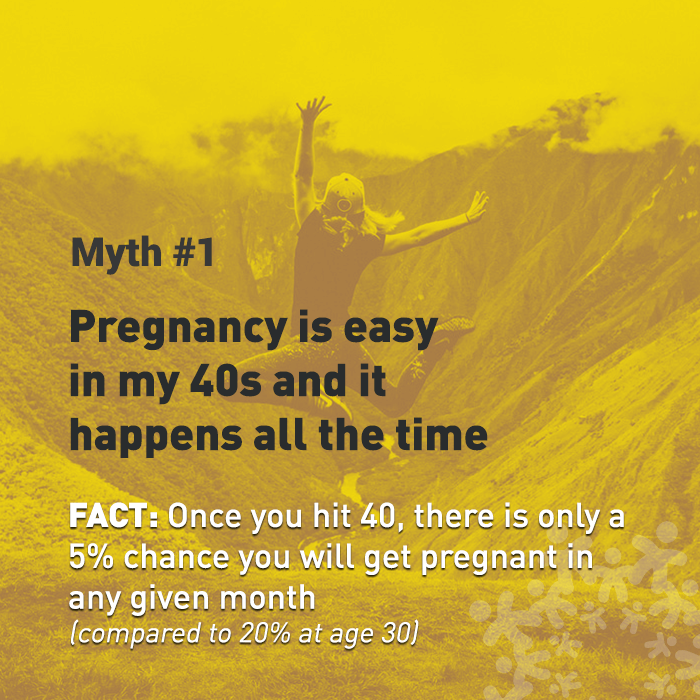
1. Pregnancy is easy in your 40s and happens all the time.
Once you hit 40, there is only a five percent chance you will get pregnant in any given month (compared to 20 percent at age 30). Pregnancy is possible, but women need to know the most valuable and irreversible factor impacting success is time. This is largely due to a steady decline in egg quality that begins when a woman is in her early 30s and accelerates in her late 30s.
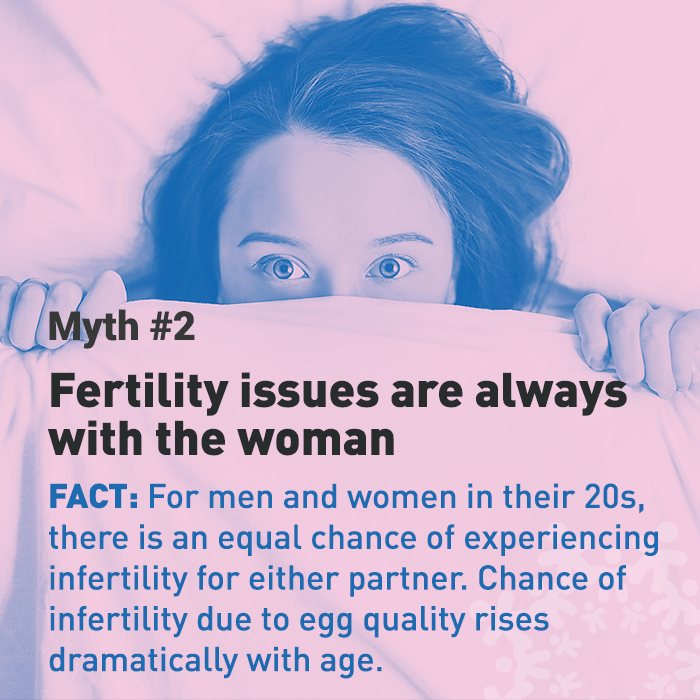
2. Fertility issues are always with the woman.
For men and women in their 20s, there is an equal chance of experiencing infertility for either partner. For couples with a female partner in her late 30s or 40s, the chance of infertility due to egg quality rises dramatically.
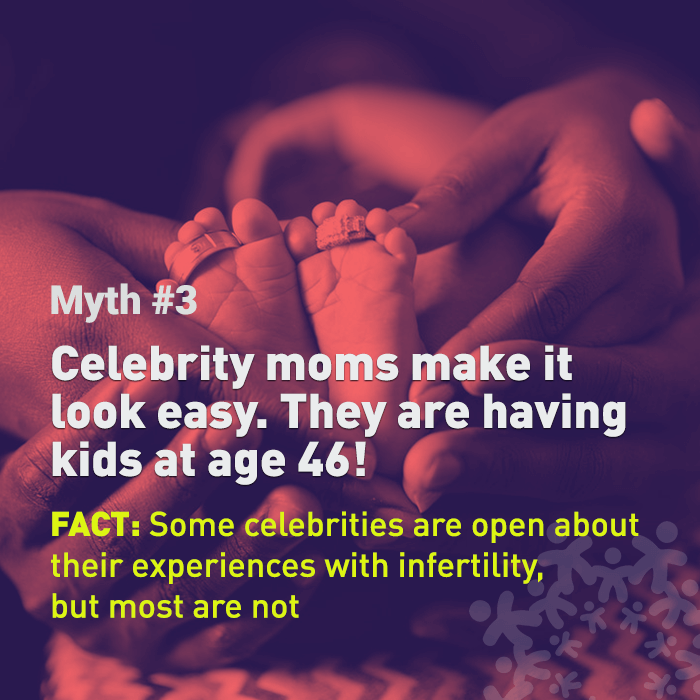
3. Celebrity moms make it look easy. They are having kids at age 46!
There is an endless stream of celebrity mothers who are having kids in their 40s. Halle Berry had her baby at 46, Kelly Preston at 47, and Geena Davis had twins at 48. While it’s statistically unlikely that some older celebrities are having children without any assistance, it’s important to not compare your experiences with others. Some celebrities are open about their experiences with infertility, but most are not.
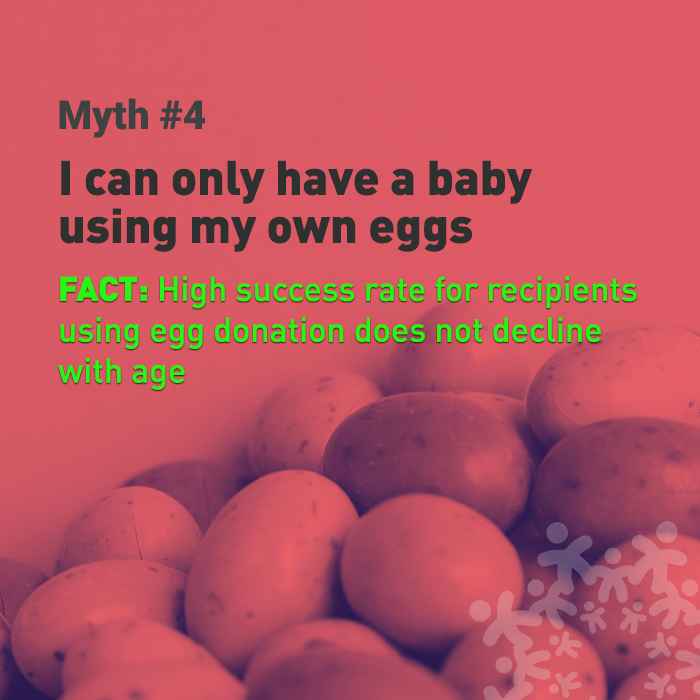
4. You can only have a baby using your own eggs.
According to the respected medical journal Fertility and Sterility, 40-year-old women treated for infertility have a 25 percent chance of achieving pregnancy using their own eggs. By age 43 that number drops to 10 percent, and by 44 it becomes 1.6 percent. For those who are unable to use their own eggs, the good news is that women can achieve pregnancy success using donor eggs regardless of her age. Women at 40 using donor egg give birth at a rate of roughly 45 percent, a success rate higher than younger women using their own eggs. The high success rate for recipients using egg donation does not decline with age.
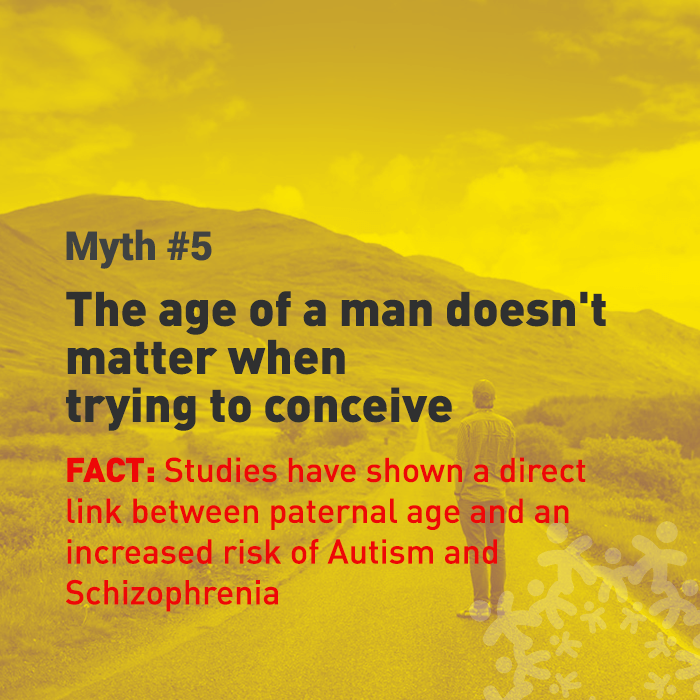
5. The age of a man doesn't matter when trying to conceive.
Age matters for both men and women. A study published by scientific journal Nature found a direct link between paternal age and an increased risk of Autism and Schizophrenia, which experts say may be one of the factors in the rise of autism diagnosis in recent years. The increase in medical problems with advancing male age is very small; the autism increase may be from 1 in 150 in the general population to 1 in 100 for men over 50. As women age, the chances of chromosomal abnormalities such as Down Syndrome increase. These abnormalities typically occur due to a decrease in the quality of the egg with aging. A 25-year-old woman has a 1 in 1000 chance of having a baby with Down Syndrome. The chance is 1 in 30 in a 44-year-old using her own eggs.
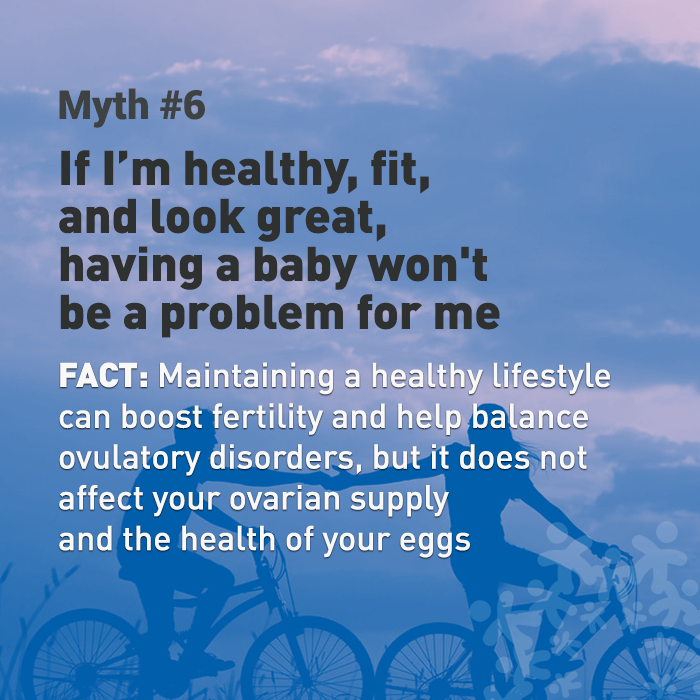
6. If you're healthy, fit, and look great, having a baby won't be a problem.
You do yoga, run half marathons, eat organic and fit into a size six. But do your ovaries do yoga? The truth is that eating nutritiously and maintaining a healthy weight can boost fertility and help balance ovulatory disorders, but it does not affect your ovarian supply and the health of your eggs.
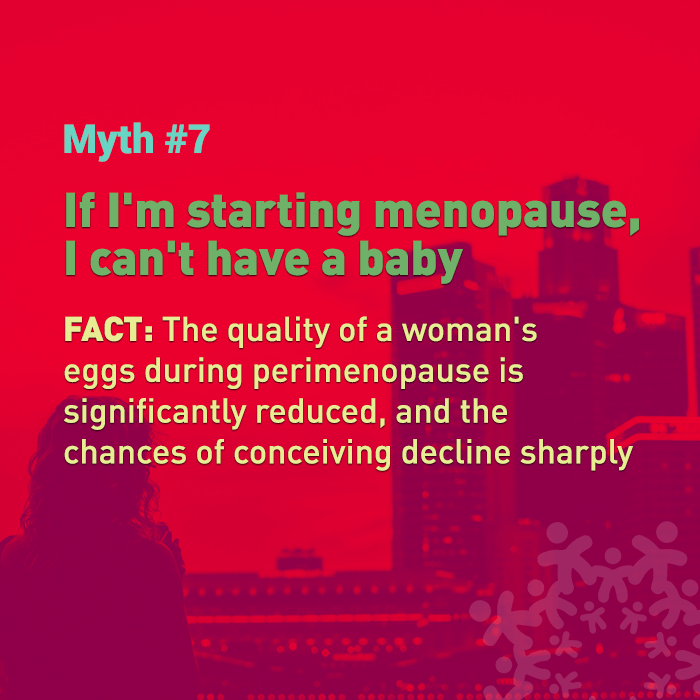
7. If I'm starting menopause, I can't have a baby.
There is about a 10-year phase of perimenopause that precedes the complete cessation of menstrual function, known as menopause. The quality of a woman's eggs during this time is significantly reduced, and the chances of conceiving decline sharply. The chance of a miscarriage, for those who do conceive, is significantly increased. For women beginning perimenopause, a pregnancy may still be possible, depending on where your body is at in the perimenopausal process. To increase the chances of success and save time, both parties should undergo basic fertility testing.
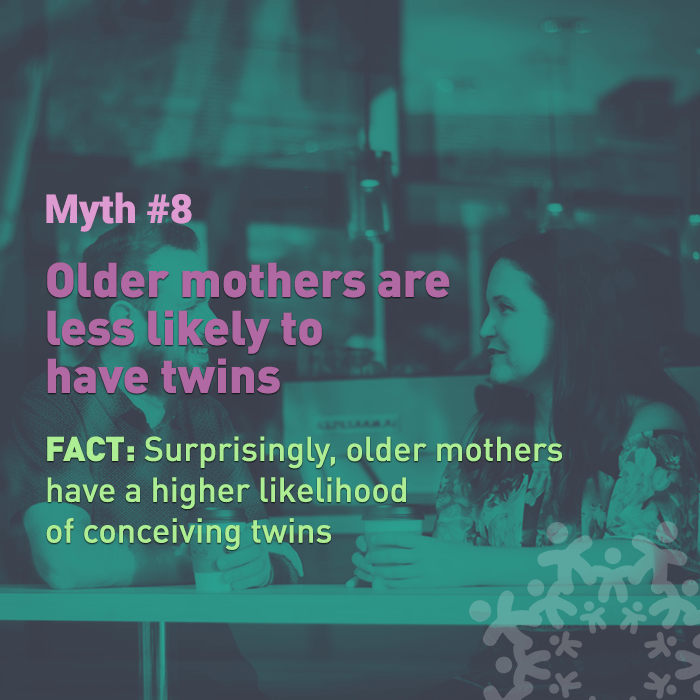
8. Older mothers are less likely to have twins.
Surprisingly, older mothers have a higher likelihood of conceiving twins. As a woman ages, her follicle stimulating hormone increases. FSH develops eggs inside the ovaries prior to being released into the fallopian tubes. High FSH levels can cause two or more eggs to release, which can result in twins. The likelihood of spontaneously conceived twins rises from 1 in 80 in a 25-year-old to 1 in 40 in a 42-year-old. Higher FSH levels are also associated with declining fertility, which means follicles may work overtime and release more eggs to compensate for lowering fertility. Twin rates have also increased due to general fertility and IVF treatment, and patients choosing to transfer multiple embryos. The latest data shows that twin rates are declining as many women choose to transfer one embryo.
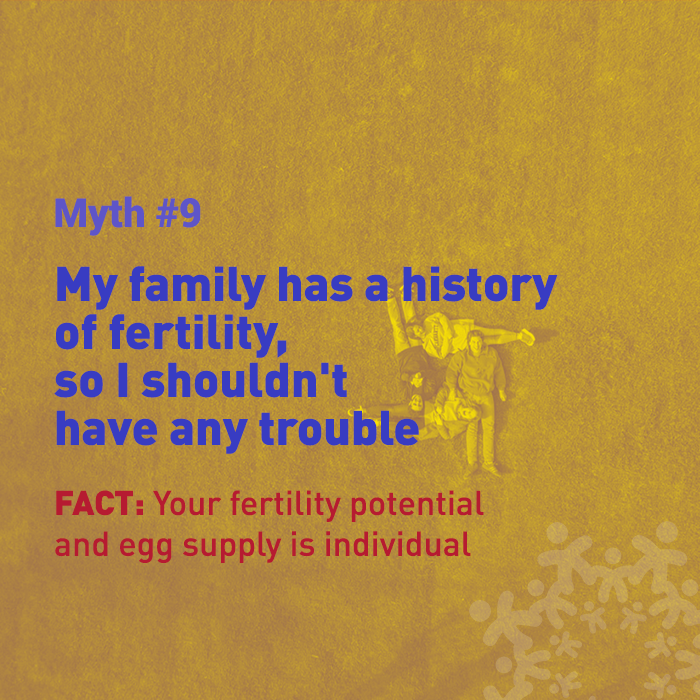
9. Your family has a history of fertility, so you shouldn't have any trouble.
There is a genetic component to ovarian function and a correlation between your mother’s and grandmother’s ability to conceive at an older age. However, this is a very limited factor and cannot provide significant reassurance. Conversely, if there is a history of early menopause in your family this will raise the likelihood of a problem. Your fertility potential and egg supply is individual. If your grandmother had her last baby at 43 and your mother had infertility at 41, this does not make your chances of conception any higher or lower.
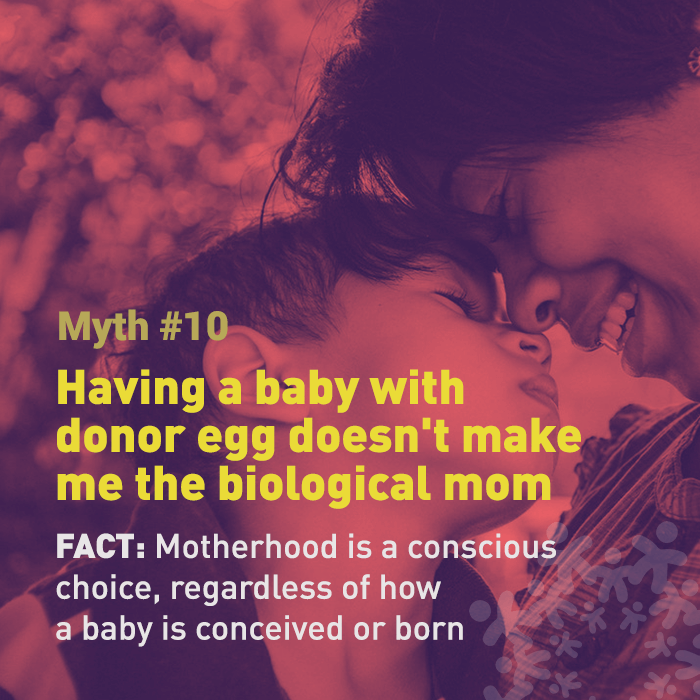
10. Having a baby with donor egg doesn't make you the biological mom.
The egg donor is a genetic donor who provides the egg cell and half of the DNA in the creation of each baby, but the woman who carries the pregnancy provides the biological environment to allow the embryo and baby to thrive. The woman who intends to parent is the true mother of the child. Motherhood is a conscious choice, regardless of how a baby is conceived or born.

Read next: PREGNANCY AT 40+: LIKELIHOOD, RISKS, AND SUCCESS FACTS
Author Bio: Heidi Hayes is a mother of three through adoption and donor eggs. After her personal experiences with infertility and professional experience in the infertility industry, she now helps others achieve their dreams of having a family as the Executive Vice President of California Cryobank.
Donor Egg Bank USA is a frozen donor egg program developed through the collaboration of more than 150 of the country's top reproductive specialists and available at more than 100 locations throughout the United States and Canada. Donor Egg Bank USA offers immediate access to a broad donor egg pool and uses advanced freezing technology to produce success rates similar to traditional (fresh) donor egg programs. Using frozen eggs from Donor Egg Bank USA requires less time than a fresh donor egg cycle (1-3 months versus 4-6 months in a traditional cycle), and is more affordable. Donor Egg Bank USA offers the financial security of a 100% Assured Refund PlanΓäó if a couple does not deliver a baby. Donor Egg Bank USA offers frozen egg fertility options to couples nationally and across the globe. For more information: donoreggbankusa.com, 855-344-2265.